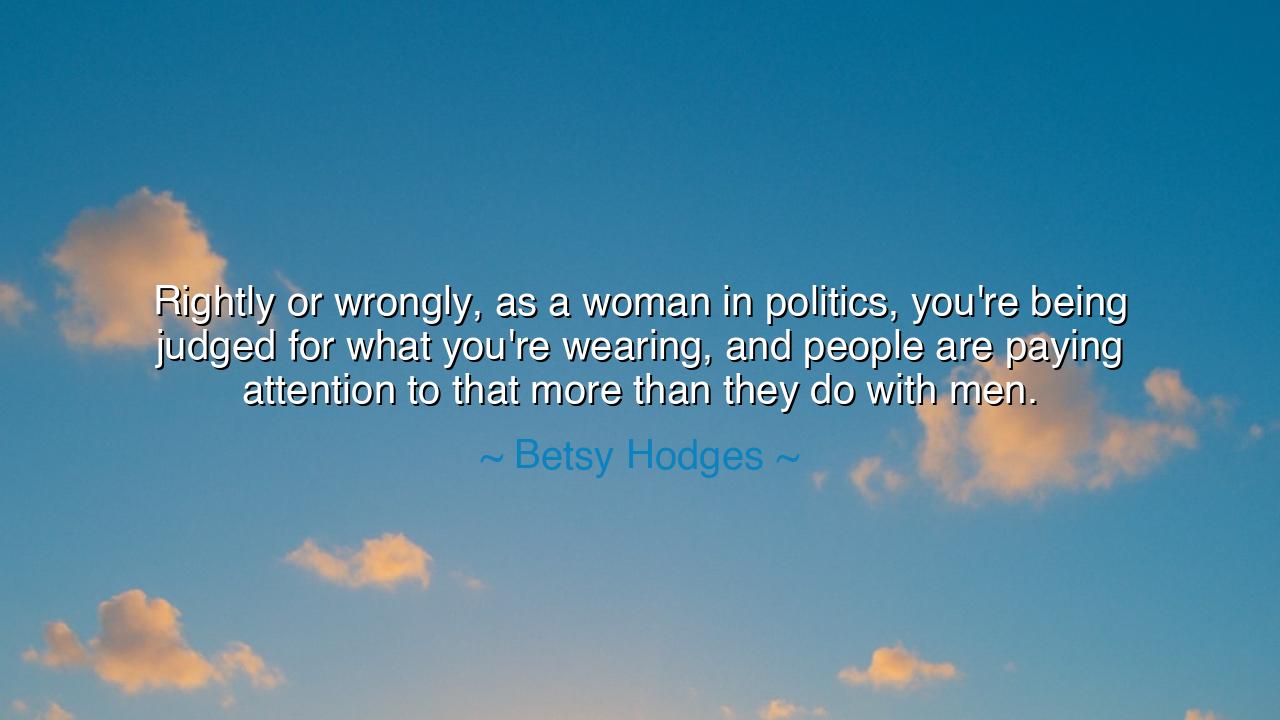
Rightly or wrongly, as a woman in politics, you're being judged
Rightly or wrongly, as a woman in politics, you're being judged for what you're wearing, and people are paying attention to that more than they do with men.






"Rightly or wrongly, as a woman in politics, you’re being judged for what you’re wearing, and people are paying attention to that more than they do with men." Thus spoke Betsy Hodges, voicing the burden carried by countless women who enter the public arena. Her words unveil a harsh truth: that in a realm meant for ideas, laws, and leadership, women are still weighed by garments, appearances, and the surface, while men are measured by power and deed.
The ancients, too, saw this injustice. In Athens, Aspasia, though wise and eloquent, was remembered more for scandal than for her counsel to Pericles. In Rome, Livia Drusilla, wife of Augustus, was whispered about for her robes and demeanor, though her influence upon the empire was vast. The judgment of women by appearance is not new; it is an ancient chain, yet one that must be broken if the world would walk upright in truth.
Consider the story of Margaret Thatcher, the "Iron Lady." Her policies and leadership reshaped Britain, yet still the press often dwelt upon her voice, her hair, her clothing. While her male peers were critiqued for policy, she was endlessly scrutinized for presentation. Though she bore this scrutiny with steel, it reveals what Hodges declares: that the woman in politics fights two battles, one for her vision and another against the shallowness of appearance.
So too in more recent years, Hillary Clinton stood before the world as senator, secretary, and candidate for the presidency. Yet again and again, the discourse turned not to her arguments but to her pantsuits, her tones, her expressions. Here is proof that what Hodges spoke was no idle complaint but the reflection of lived history: the cloak of judgment that weighs heavier on women than men.
Therefore, let this truth be carried forward: the worth of a leader is not in fabric or fashion, but in wisdom, courage, and justice. To judge a woman by what she is wearing rather than by what she is doing is to blind ourselves to greatness. Let the generations learn: cast aside these shallow measures, and see the soul within. For only when both men and women are weighed by the same scales will politics rise to its rightful dignity.






TT34. Nguyen Thi Thuong
This quote really made me reflect on the way society often prioritizes superficial details over substance. I wonder if women in politics feel this pressure more today due to social media and constant public exposure. Is there a way to break free from these expectations, or does it come down to how the media and the public continue to frame female leadership?
PAThai Pham Anh
I think this statement from Betsy Hodges is a powerful reminder of how women are often held to different standards in public life. It’s as if the quality of a woman’s character or ideas doesn’t matter as much if she’s not wearing the ‘right’ thing. Is it possible to change how we view female politicians, or are we so conditioned to scrutinize their appearances that this will always be a part of the equation?
KQNgoc Khue Quach
This quote highlights the double standard that women in politics face. As a woman, it’s exhausting to think that your words and actions are not enough to be noticed, and instead, people are fixated on your clothes. Do you think that women politicians could challenge this norm, or is it something ingrained in our culture that needs a larger societal shift to address?
TTNguyen Tri Tue
It's unfortunate that in politics, a woman’s choice of attire often overshadows the substance of her message. It makes me wonder if we are subconsciously reinforcing gender biases. Why do you think this judgment on appearance persists so strongly in the public eye? Are we ever going to reach a point where women can be judged purely on their political actions and ideas, rather than what they wear?
TDTruc Doris
I completely agree with Betsy Hodges. It's frustrating that women in politics often have to endure extra scrutiny, especially when it comes to their appearance. Why is it that a male politician's choice of clothing is rarely questioned, yet women can't seem to escape it? Do you think this focus on appearance undermines the serious nature of their work, or does it reflect the broader expectations society places on women in general?